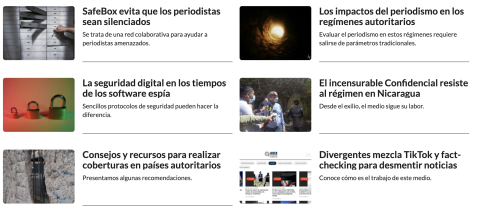
A new resource to support vital reporting in authoritarian contexts is now available for Spanish-speaking journalists and newsrooms. The International Journalists’ Network (IJNet)’s Spanish site has published its Kit de herramientas para reportear en contextos autoritarios, developed under an ICFJ program.
The toolkit spotlights new tools like the SafeBox Network, which can help journalists safeguard their reporting against threats to silence them, and offers advice for reporters to protect their digital security amid heightened spyware and hacking concerns.
Featured, too, are case studies about how newsrooms are navigating Nicaragua’s backslide into authoritarianism. The investigative outlet Confidencial has continued its reporting from exile in the face of the country's crackdown on press freedom, for example, while Divergentes has harnessed TikTok to amplify its own investigative and fact-checking efforts.
And what about tracking the impacts these journalists and newsrooms are having? The toolkit provides suggestions for how best to gauge impact in authoritarian contexts.
“This toolkit fills what is a critical need for journalists today amid growing repression of independent media in Latin America,” said ICFJ Senior Program Director Aliza Appelbaum. “These resources will help journalists protect themselves and their sources as they continue to report courageously amidst a violent crackdown against the free press.”
This two-year program has been supporting independent media in Nicaragua, with a focus on investigative reporting and media literacy. In collaboration with Connectas, ICFJ’s regional partner, this program also published #NicaraguaNoCalla, a collection of investigative pieces detailing corruption in the Ortega regime.
IJNet Spanish Editor Santiago Sanchez spearheaded the toolkit, with help from IJNet contributors across Latin America. Explore the toolkit here. If you learn something from the toolkit that you use to tell your own story, please share it with ICFJ and IJNet on Facebook, Instagram or Twitter.